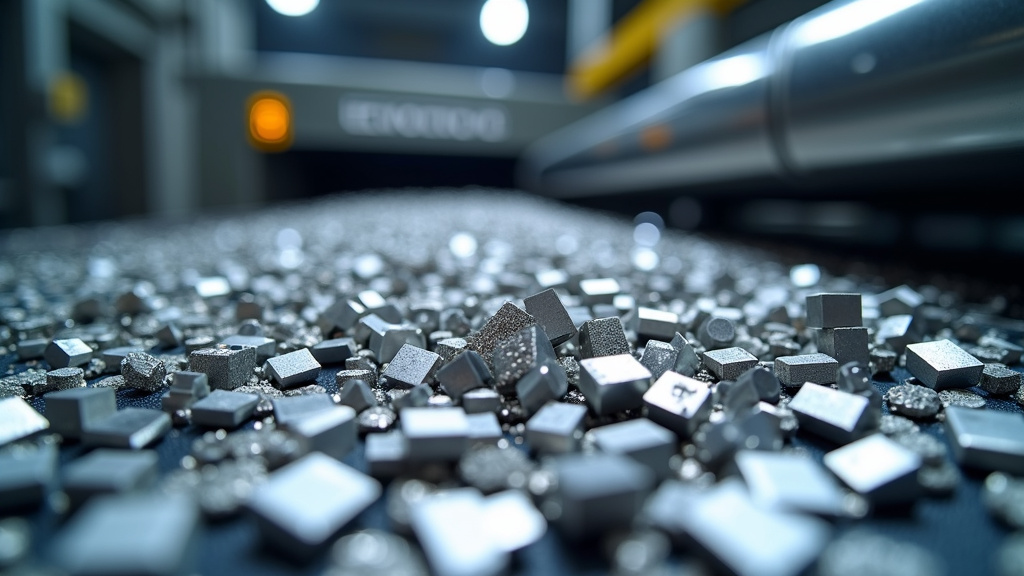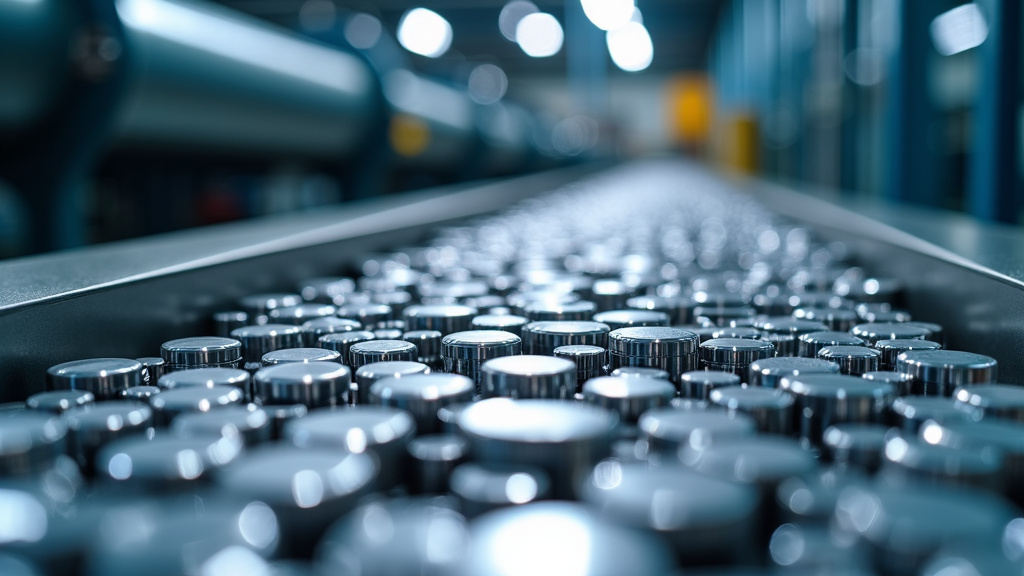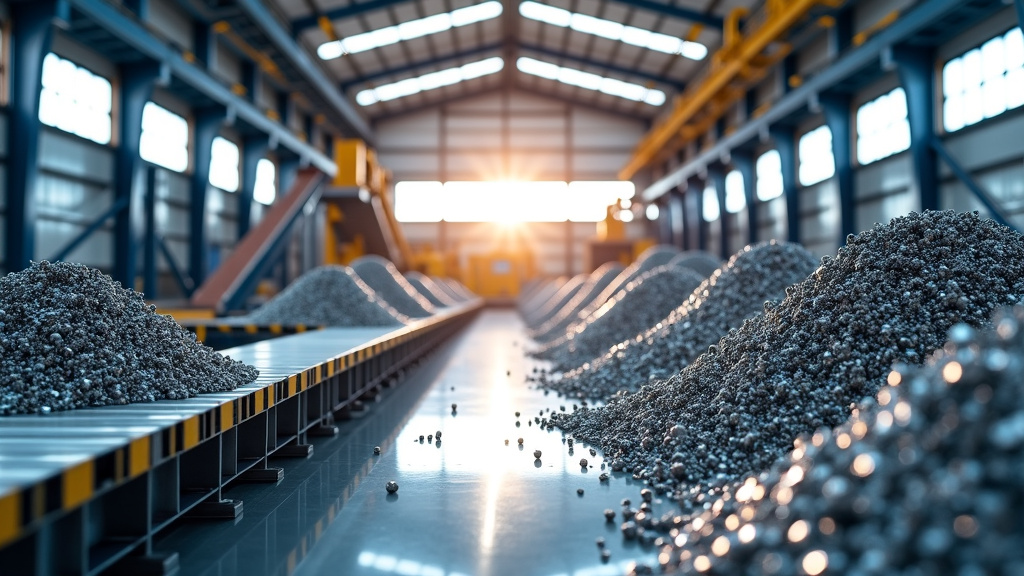5901 Botham Jean Blvd, Dallas, TX 75215
Nickel and Titanium Recycling: Sustainable Metal Recovery
February 4, 2025Have you ever wondered what happens to the titanium in your old laptop or the nickel in your worn-out cookware? These aren’t just any metals—they’re vital components of our modern world, powering everything from smartphones to medical devices.
But here’s the challenge: we’re depleting them faster than you can say “sustainability crisis.”
Titanium and nickel are the heavyweights of the metal world. They’re incredibly strong, surprisingly light, and resistant to corrosion. It’s no wonder aerospace engineers and medical device manufacturers value them so highly. However, mining and processing these metals takes a significant toll on our planet.
This is where recycling steps in as a crucial solution. By giving these metals a second life, we’re not just being economical—we’re offering a vital lifeline to the environment. Recycling titanium can reduce energy use by up to 95% compared to extracting it anew. It’s a win for both your wallet and the world!
However, recycling titanium and nickel isn’t straightforward. It’s more like navigating a high-tech obstacle course. These metals are often mixed in complex alloys, making separation a challenging task for recyclers. Contamination is another issue—even a small impurity can render a batch of recycled metal unusable.
So why go through the recycling process? Because the benefits are substantial. We’re talking about conserving resources, reducing pollution, and potentially saving money. It’s a classic case of “no pain, no gain”—but the “gain” here is a healthier planet and a more sustainable future for everyone.
Challenges and Opportunities in Titanium Recycling

Titanium recycling presents unique challenges that require innovative solutions. The process involves intricate steps, from sorting titanium from other metals to removing stubborn impurities like machining oils. While significant, these hurdles also open doors to exciting opportunities in industrial recycling.
One primary obstacle in titanium recycling is contamination. Even trace amounts of foreign materials can compromise the quality of recycled titanium, rendering it unsuitable for critical applications in aerospace or medical industries. “Titanium’s high-performance standards make it exceptionally sensitive to contamination,” notes a recent industry report, underscoring the need for advanced filtration technologies and rigorous quality control procedures.
Okon Recycling, a leader in the field, has developed efficient processes to tackle these challenges head-on. Their expertise in handling complex materials like titanium showcases the potential for large-scale recycling solutions. By employing cutting-edge sorting techniques and specialized cleaning methods, Okon has significantly improved the purity of recycled titanium.
Innovative Solutions in Titanium Recycling
The titanium recycling industry is witnessing a surge of innovation aimed at overcoming traditional barriers. Advanced technologies such as magnetic separators and optical sensors are enhancing the sorting process, ensuring higher accuracy in separating titanium from other metals.
One groundbreaking development is the emergence of Titanium Powder Scrap. This recycled product, derived from manufacturing waste and end-of-life components, is gaining traction due to its unique properties and versatile applications. According to industry experts, Titanium Powder Scrap offers a cost-effective alternative to traditional titanium raw materials, particularly beneficial for smaller companies with limited budgets.
The cleaning process, crucial for removing impurities like machining oils, has also seen significant advancements. Industrial cleaning techniques, including chemical baths and blasting methods, have been refined to ensure thorough removal of contaminants without compromising the titanium’s integrity.
Economic and Environmental Benefits
The drive towards efficient titanium recycling is not just about overcoming technical challenges; it’s also about reaping substantial economic and environmental benefits. Recycling titanium uses 95% less energy compared to producing new titanium from raw materials, presenting a compelling case for sustainability.
Moreover, the economic advantages are hard to ignore. As the demand for titanium continues to rise across various industries, recycling offers a cost-effective way to meet this demand. Okon Recycling’s success in handling complex materials demonstrates the viability of large-scale recycling operations, paving the way for a more circular economy in metal production.
The environmental impact of titanium recycling extends beyond energy savings. By reducing the need for mining, recycling helps preserve natural habitats and minimizes the carbon footprint associated with titanium production. This aligns perfectly with global efforts towards sustainable industrial practices and resource conservation.
Future Prospects and Challenges
While significant strides have been made in titanium recycling, challenges remain. The initial investment required for setting up advanced recycling facilities can be substantial, deterring smaller players from entering the market. Additionally, the complex nature of modern products often makes it difficult to extract titanium efficiently, necessitating further innovations in recycling technologies.
However, the future looks promising. As awareness of the importance of metal recycling grows, so does the push for more efficient and cost-effective recycling solutions. Companies like Okon Recycling are at the forefront of this movement, continuously improving their processes and expanding their capabilities to handle a wider range of materials.
The titanium recycling industry stands at a crucial juncture, balancing challenges with immense opportunities. As technologies evolve and industries increasingly prioritize sustainability, the role of efficient recycling solutions becomes ever more critical. The journey of titanium from industrial waste to valuable resource is not just a testament to human ingenuity but also a beacon of hope for a more sustainable future in metal production and utilization.
| Aspect | Recycling Titanium | Producing New Titanium |
|---|---|---|
| Energy Use | 5% | 100% |
| Environmental Impact | Significantly Reduced | High |
| Cost Efficiency | Cost-effective | Expensive |
The Process of Nickel Recycling: Sustainable Metal Recovery

Nickel recycling is at the forefront of sustainable resource management, offering a compelling alternative to traditional mining. This process conserves valuable natural resources and significantly reduces the environmental impact associated with primary nickel production. Let’s explore the intricate steps of nickel recycling and see how companies like Okon Recycling are advancing this essential industry.
Collection: The First Step Towards Sustainability
The journey of recycled nickel begins with collection. This critical phase involves gathering nickel-containing materials from various sources, including industrial scrap, electronic waste, and end-of-life products. According to industry experts, the aerospace and automotive sectors are major contributors to recyclable nickel, with components like aircraft parts and electric vehicle batteries serving as rich sources.
Efficient collection systems are vital for maximizing recycling rates. Okon Recycling, with its extensive network and state-of-the-art facilities, excels in this area, ensuring that valuable nickel-containing materials are diverted from landfills and channeled into the recycling stream.
The collection process not only prevents waste but also reduces the need for environmentally destructive mining operations. By tapping into existing nickel sources, we can conserve natural habitats and minimize the carbon footprint associated with resource extraction.
Sorting: Precision in Material Separation
Once collected, nickel-containing materials undergo a meticulous sorting process, which is critical for ensuring the quality and purity of the recycled nickel. Advanced technologies, such as X-ray fluorescence (XRF) analyzers, play a pivotal role in accurately identifying and categorizing different nickel alloys and compounds.
Okon Recycling’s expertise shines in this phase, employing cutting-edge sorting techniques to handle complex nickel-containing materials efficiently. Their sophisticated processes differentiate between various nickel alloys, ensuring that each type is properly classified for optimal recycling.
Proper sorting not only enhances the efficiency of subsequent refining processes but also contributes to the production of high-quality recycled nickel that meets industry standards. This precision in material separation is key to maintaining the value and integrity of recycled nickel products.
Refining: Transforming Scrap into Valuable Resources
The refining stage is where true transformation occurs, turning sorted nickel scrap into purified, reusable nickel. This process involves a series of chemical and metallurgical treatments designed to separate nickel from other elements and impurities.
Hydrometallurgical techniques are gaining popularity in nickel recycling due to their efficiency and lower environmental impact. These methods use chemical reactions in aqueous solutions to selectively extract nickel, offering higher recovery rates compared to traditional pyrometallurgical approaches.
Okon Recycling’s advanced refining capabilities ensure that the nickel recovered from recycled materials meets or exceeds the quality of primary nickel. This high-grade recycled nickel can then be reintroduced into the manufacturing cycle, serving as a sustainable alternative to newly mined resources.
Environmental Benefits: A Greener Future with Recycled Nickel
The environmental advantages of nickel recycling are profound and far-reaching. By reducing reliance on primary nickel mining, we can significantly decrease habitat destruction, soil erosion, and water contamination associated with extractive industries.
Moreover, recycling nickel requires substantially less energy compared to primary production. This energy efficiency translates into lower greenhouse gas emissions, contributing to global efforts to combat climate change. The recycling process also helps conserve valuable water resources, which are often heavily used in traditional mining operations.
Okon Recycling’s commitment to sustainable practices amplifies these environmental benefits. Their efficient recycling processes not only conserve resources but also minimize waste generation, creating a more circular and environmentally friendly nickel economy.
Economic Impact: Driving Industry Growth Through Recycling
The nickel recycling industry, led by companies like Okon Recycling, is a significant economic driver. It creates jobs across various sectors, from collection and processing to refining and manufacturing. The cost-effectiveness of recycled nickel often leads to more competitive pricing for nickel-containing products, benefiting both manufacturers and consumers.
Furthermore, by reducing dependence on volatile primary nickel markets, recycling helps stabilize supply chains and insulate industries from price fluctuations. This stability is particularly crucial for sectors heavily reliant on nickel, such as the rapidly growing electric vehicle battery market.
Okon Recycling’s role in this economic ecosystem is pivotal. By providing efficient, high-quality nickel recycling services, they enable industries to leverage the benefits of recycled materials, fostering sustainable growth and innovation.
Conclusion: Embracing a Sustainable Nickel Future
The process of nickel recycling, from collection to refining, represents a crucial step towards a more sustainable and resource-efficient future. Companies like Okon Recycling are at the forefront of this transformation, offering expertise and innovative solutions that make recycling not just environmentally beneficial but also economically viable.
As industries increasingly recognize the value of recycled nickel, the demand for efficient recycling services continues to grow. By choosing recycled nickel over primary sources, businesses can significantly reduce their environmental footprint while contributing to a more circular economy.
The journey of nickel recycling is more than just a process—it’s a commitment to sustainability, resource conservation, and responsible industrial practices. As we move forward, the role of recycled nickel in shaping a greener, more sustainable future becomes increasingly clear and crucial.
Conclusion: Embracing Innovative Recycling Solutions

The recycling of titanium and nickel is crucial for reducing environmental impacts and supporting sustainable practices. These metals, essential to various industries, can be rejuvenated through innovative recycling, conserving resources and minimizing waste.
Leading this green revolution is Okon Recycling, a company at the forefront of metal recycling for over a century. Their dedication to innovation and sustainability has transformed waste management, particularly for complex metals like titanium and nickel.
Okon’s state-of-the-art facilities in Dallas, Texas, showcase how advanced technologies can address challenging recycling tasks. Materials once destined for landfills, such as industrial magnets and construction chillers, are now repurposed, highlighting the potential of modern recycling techniques.
These efforts impact more than just waste reduction. By recycling titanium and nickel, we conserve natural resources and significantly reduce the energy consumption and carbon emissions associated with mining and processing new materials. This circular approach is vital in combating climate change and resource depletion.
Looking to the future, the role of companies like Okon Recycling is indispensable. Their innovative solutions pave the way for a more sustainable industrial sector, where waste is seen as a valuable resource.
To appreciate the transformative power of metal recycling, action is needed. Whether you have scrap metal or a business looking to optimize waste management, exploring Okon Recycling’s services is a step towards sustainability. Partnering with industry leaders in recycling contributes to resource conservation and environmental protection.
Ready to make a difference? Contact Okon Recycling at 214-426-6566 to learn about their innovative recycling solutions and join the movement towards a cleaner, greener world.
